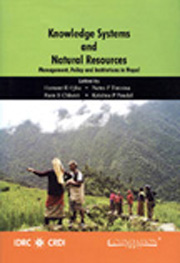Book contents
- Frontmatter
- Contents
- Preface
- Abbreviations
- Glossary of Nepali Words
- 1 Knowledge Systems and Deliberative Interface in Natural Resource Governance: An Overiew
- 2 Agricultural Technology Development in Nepal: Critical Assessment from Knowledge System Perspective
- 3 Contested Knowledge and Reconciliation in Nepal's Community Forestry: A Case of Forest Inventory Policy
- 4 From Grassroots to Policy Deliberation: The Case of Community Forest Users' Federation in Nepal
- 5 From Isolation to Interaction: Increasing Knowledge Interface in Chhattis Mauja Irrigation system in Nepal
- 6 Action Research Experience on Democratising Knowledge in Community Forestry in Nepal
- 7 Culturally Embedded Knowledge in Irrigation: People's Ways of Thriving in a Himalayan Village
- 8 Deliberative Knowledge Interface: Lessons and Policy Implications
- About the Contributors
3 - Contested Knowledge and Reconciliation in Nepal's Community Forestry: A Case of Forest Inventory Policy
Published online by Cambridge University Press: 26 October 2011
- Frontmatter
- Contents
- Preface
- Abbreviations
- Glossary of Nepali Words
- 1 Knowledge Systems and Deliberative Interface in Natural Resource Governance: An Overiew
- 2 Agricultural Technology Development in Nepal: Critical Assessment from Knowledge System Perspective
- 3 Contested Knowledge and Reconciliation in Nepal's Community Forestry: A Case of Forest Inventory Policy
- 4 From Grassroots to Policy Deliberation: The Case of Community Forest Users' Federation in Nepal
- 5 From Isolation to Interaction: Increasing Knowledge Interface in Chhattis Mauja Irrigation system in Nepal
- 6 Action Research Experience on Democratising Knowledge in Community Forestry in Nepal
- 7 Culturally Embedded Knowledge in Irrigation: People's Ways of Thriving in a Himalayan Village
- 8 Deliberative Knowledge Interface: Lessons and Policy Implications
- About the Contributors
Summary
Introduction
Socially powerful actors tend to influence the resource governance decisions using various forms of power. They influence the values, behaviour and action of an individual as well as institutions in various ways. In this process, how the knowledge in practice is contested and politicised in influencing such decisions is a growing concern. Increasingly, it has become more important to understand the ways through which certain knowledge is legitimised within institutions and decision making process and how it is impinging on the daily lives and struggles of the poor and powerless, especially women and indigenous people who are highly dependent on forest resources for their livelihoods. In this context, there is a need to understand better the social dynamics of natural resource management with particular reference to knowledge related politics.
Common pool resources, including forest resources, have been highly contested domains in developing countries including Nepal. Various actors with their diverse interests are engaged and influence the overall contexts, processes and outcomes of the resource management regimes. Over the past 25 years of implementation of community forestry in Nepal, about 35 per cent of the total population is involved in the management of about 27 per cent forest land, generating 900 million rupees annually from the sale of forest products (Kanel 2004). Underpinning this development is an increased level of citizen's concern over those resources.
- Type
- Chapter
- Information
- Knowledge Systems and Natural ResourcesManagement, Policy, and Institutions in Nepal, pp. 40 - 59Publisher: Foundation BooksPrint publication year: 2007
- 2
- Cited by



